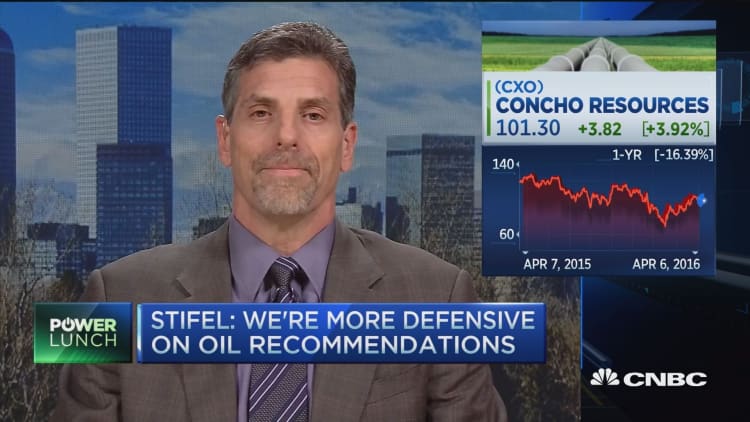
Oil's rally could fizzle if there's no agreement among major producers for a freeze later this month, and the ripples could be felt across global markets.
"It totally matters. The market goes up and down by who said what last," said John Kilduff, partner at Again Capital, of the meeting. "I don't think there's going to be a deal but it makes a market here."
Crude futures surged more than 5 percent Wednesday, helped by a weaker dollar and a drawdown in U.S. supplies by 4.9 million barrels when the market expected a build. West Texas Intermediate futures settled at $37.75 per barrel.
Oil also got a lift this week from comments made by Kuwait's OPEC governor, Nawal Al-Fuzaia, who on Tuesday said all signs point to an agreement among producers to hold output levels at the April 17 meeting in Doha.
The Kuwaiti governor's comments are in contrast to remarks last week from Saudi Deputy Crown Prince Mohammed bin Salman who said the kingdom will not freeze production unless Iran also agrees. Those comments sent oil sharply lower, as Iran is working to return crude to the market and has said it will not agree to a freeze.
"They're like the Janet Yellen of the oil production group. Everyone says one thing, and they say something else. Everyone says there's going to be a freeze, and the Saudis disagree. They're like Janet Yellen," said Kilduff. Fed Chair Yellen rocked markets last week when she sounded much more dovish than other members of the central bank.
"The rhetoric around this meeting intensifies every day," said Kilduff. Bin Salman's comments surprised oil traders last week, as Saudi Arabia had been publicly supporting the idea of a freeze.
"Things would have been a lot more robust if we thought there was going to be a commitment on the production side," said Bart Melek, head of commodities strategy at TD Securities. If there is no deal, he said WTI could fall back in the low- to mid-$30s per barrel, but he does not expect it to retest its lows in the $20s. For now, he sees WTI as range bound, and not likely to break above $42.
"I think the market is going to punish OPEC and producers for not coming through with a deal," said Kilduff, adding he believes oil could head back to its lows if there is no accord.
Andrew Lipow, president of Lipow Oil Associates, said, on the other hand, that the market may have already priced in failure by the producers.
"It's my take they are doing nothing, and their actions are in direct opposition to what they're trying to accomplish," said Lipow. "I think the market is very skeptical something's going to happen. We've seen Russian production increase in February. We saw Kuwait and Saudi Arabia announced an agreement to restart production in what's known as the neutral zone oil field, which has a capacity of 300,000 barrels a day."
Production in the U.S.has actually been on the decline. According to the Energy Information Administration, oil output in the U.S. fell to 9.01 million barrels a day last week, from 9.02 million barrels. It has been slowly slipping from the 9.6 million barrels a day peak a year ago.
Lipow said production could drop below 9 million barrels a day in the near future. "I think that psychologically will hit the market," he said.
U.S. production continued to rise after OPEC announced it would let the market set prices in November 2014, and the market has been waiting for it to fall as U.S. producers react to the pain of low prices. Lipow also found negatives in the government's weekly inventory data in that supplies of gasoline and distillate increased.
Now focus is on the Doha meeting, but Melek said failure to reach a deal there may set the stage for a change in policy by the Organization of the Petroleum Exporting Countries when it meets in June.
The Doha meeting is also not just being watched by the oil markets. Jim Caron, fixed income portfolio manager at Morgan Stanley Investment Management, said the event is on his radar, as it could drive the price of oil. He said if the meeting does not go well, and crude falls sharply that could send buyers into the safety of Treasurys.
Oil in the low $30s or lower would be a negative, raising fears of bankruptcies in the sector and raising the specter of a global slowdown.
"There are two things that are driving risk premia in the market — one is China and one is oil prices," said Caron. He said while it is being watched as an indicator of global growth, investors may be overreacting to it.
Oil's gains Wednesday fired up a rally in the stock market with the energy sector outperforming. Chevron, up 2.3 percent was the biggest contributor to the Dow, and the Energy Select Sector SPDR fund rose 2.2 percent.
Art Cashin, UBS director of floor operations at the NYSE, said the stock market moved on oil Wednesday when WTI futures reached $37.10. They settled at 37.75 per barrel.
But he said there is skepticism about the April meeting among stock traders.
"They don't have very high hopes and the belief here is these guys in Saudi Arabia are focused on Iran. They're not going to freeze," Cashin said.
Jim McDonald, chief investment strategist at Northern Trust, said he does not see a big risk for markets from the Doha meeting.
"The concept of the production freeze having supported the bounce in oil prices doesn't hold water. They are unlikely to make a major concession on that. Iran has said it was not going to participate," he said. "I don't think the market has been moved by the expectation of a production freeze. Traders are trading on headlines but I just don't believe real money believe they're going to take a production freeze."


